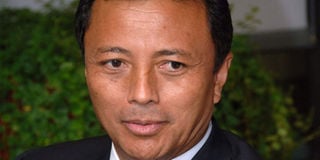Madagascar ex-leader Ravalomanana returns from exile

The former president of Madagascar, Marc Ravalomanana, has returned to the country after five years in exile in South Africa
What you need to know:
The elections were a bid to end Madagascar's economic paralysis after the international community imposed sanctions following the coup
The former president of Madagascar, Marc Ravalomanana, has returned to the country after five years in exile in South Africa.
However, unconfirmed reports say he was arrested shortly after addressing supporters near his home.
Mr Ravalomanana's previous attempts at return were blocked by his successor and rival Andry Rajoelina.
Speaking to his supporters, Mr Ravalomanana said: "I am here to support peace and democracy."
But Tim Healy, a BBC reporter in the capital, Antananarivo, says tear gas has been fired and security forces were seen outside Mr Ravalomanana's house.
Stability
Mr Ravalomanana was ousted in 2009 following a military coup and two months of bloody protests that left more than 100 dead.
Madagascar was hit by violent protests in early 2009 as anti-government protesters clashed with security forces
He fled to Swaziland before later moving to South Africa.
In 2010, he was sentenced in his absence to life imprisonment with hard labour over the deaths of 30 opposition protesters by his guards in February 2009.
Despite this, he made attempts to return home. In 2012, a plane taking him to Madagascar was turned back during the journey.
A spokesman for the South African department of international relations, Clayson Monyela, told news agency AFP he had no information on Mr Ravalomanana's return.
Hery Rajaonarimampianina became president of Madagascar in January, backed by former president Andry Rajoelina
Madagascar has become more politically stable following elections that saw former finance minister Hery Rajaonarimampianina become president in January.
The elections were a bid to end Madagascar's economic paralysis after the international community imposed sanctions following the coup.
The country was also allowed to rejoin the Southern African Development Community and African Union.
BBC



